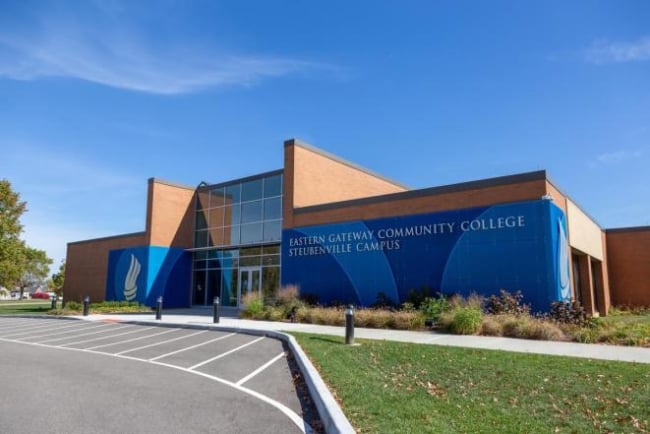You have /5 articles left.
Sign up for a free account or log in.

Eastern Gateway Community College agreed to end its controversial “free” online college benefit for union members after a lengthy dispute with the Education Department.
Department of Education
Eastern Gateway Community College is shuttering its contentious “free college” benefit after battling with the U.S. Department of Education for nearly a year.
The Ohio-based institution filed a voluntary dismissal of its lawsuit against the department last Thursday. It had pre-emptively announced July 31 it would be ending its “free college” benefit for any incoming students, in order to “move forward with productive settlement agreements with the Department of Education,” the college said in a statement.
“We have jointly come to an agreement we believe will position Eastern Gateway Community College to continue our mission to put our students first and offer the lowest cost option for you to continue on your path to a higher education,” EGCC said in the statement, referring to itself and the Education Department.
A Department of Education spokesperson confirmed the decision to enter into a preliminary settlement. The spokesperson said the department would work with Eastern Gateway to ensure students are given “support and assistance” while the college repays money owed to the department and “operates in a legally compliant manner.”
Eastern Gateway did not respond to multiple requests for comment; the Education Department declined to provide answers to questions seeking more specific information about the amount the college would repay and other matters.
Eastern Gateway first launched its Union Free College Benefit Program in 2015. American Federation of State, County and Municipal Employees members and their families were given the opportunity to earn a college degree “with no out-of-pocket cost for tuition, fees, or books after any federal or employer grants are applied,” according to the college. “Last-dollar” grants and scholarships ensure students did not have to pay tuition and fees.
The program caused Eastern Gateway’s enrollment to nearly double, shooting from roughly 20,000 to more than 40,000.
The “free college” benefit has drawn criticism for years from Ohio lawmakers, who cited concerns with the growing group of out-of-state students getting the benefit of free college.
“Students in New York City, Tacoma, San Francisco and Honolulu could take an online class without ever stepping foot in this state, and Ohio taxpayers would be on the hook to help subsidize their education,” said Jack Hershey, president of the Ohio Association of Community Colleges, in prepared remarks to the state Legislature in 2019.
The college’s accreditor, the Higher Learning Commission, began looking into the program and the college’s relationship with the Student Resource Center, an outside company that helped manage it in 2021, as Inside Higher Ed reported.
The Education Department started looking into the college in early 2022 and alleged that the college charged Pell Grant–eligible students the cost of their grant and nothing more. It also alleged the college used excess Pell Grant funds to cover the cost of non-Pell-eligible students.
The Lawsuit History
In July 2022, the Department of Education filed a cease and desist order regarding the program, stating that the college had violated federal financial aid rules. It alleged that Eastern Gateway essentially subsidized students who did not qualify for Pell Grants.
According to court documents filed in the Southern District of Ohio, in September 2022 Eastern Gateway filed a complaint against federal agency seeking injunctive relief and damages. In October, the court granted an injunction that allowed students to continue to enroll in the free college program.
The two entities continued to battle in the courtroom throughout the entirety of 2022 and the first half of 2023, with Eastern Gateway filing for a voluntary dismissal of the case.
It is unknown what will happen to the Eastern Gateway students enrolled in the program once it ends; college officials stated that it will “provide you with the last dollar scholarship for the fall semester before the program goes away.”
Troubles Continue
The settlement does not bring Eastern Gateway’s woes to an end. It is still on probation for accreditation by Higher Learning Commission, according to the organization’s spokesperson. The accreditation will be reviewed again this November.
The community college has also agreed to “repayment of some financial liability” to the U.S. Department of Education, although the ED did not specify the total amount of that repayment.
A spokesperson with the Department of Education also told Inside Higher Ed the college will provide assistance for students that choose to not continue at Eastern Gateway, although that process remains unclear.
Despite Eastern Gateway’s use of the phrase “free college” to describe its program, it is significantly different from the hundreds of free community college programs that have exploded since 2015, when then president Barack Obama put forth a proposal for national free community college in his America’s College Promise initiative.
Martha Parham, spokeswoman for the American Association of Community Colleges, said the case serves as a reminder to students to be careful when choosing colleges with programs that may seem too good to be true.





